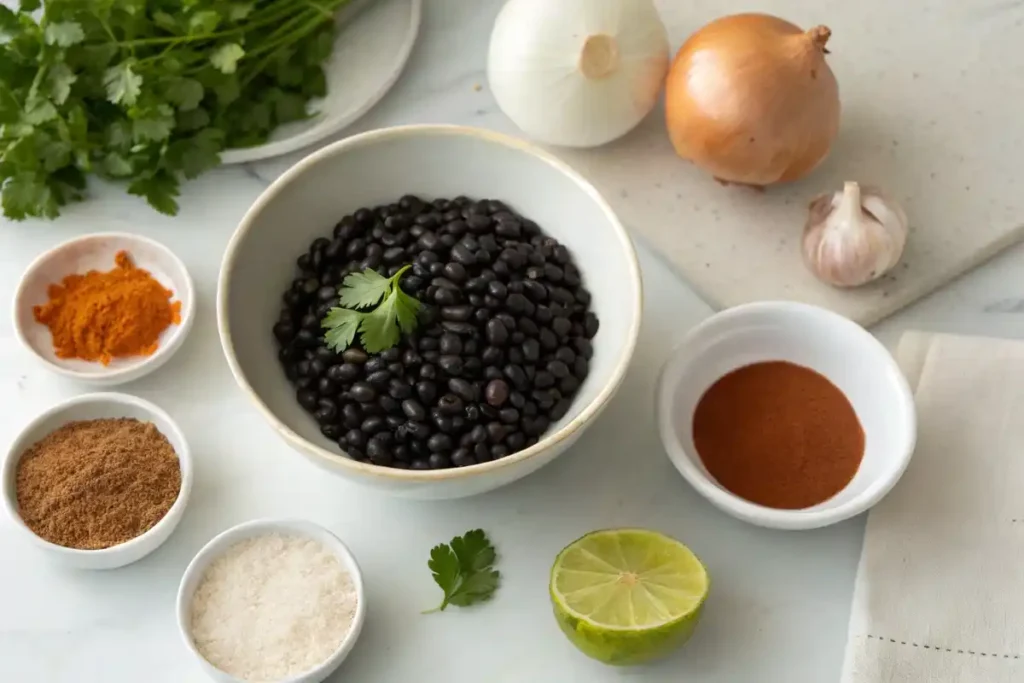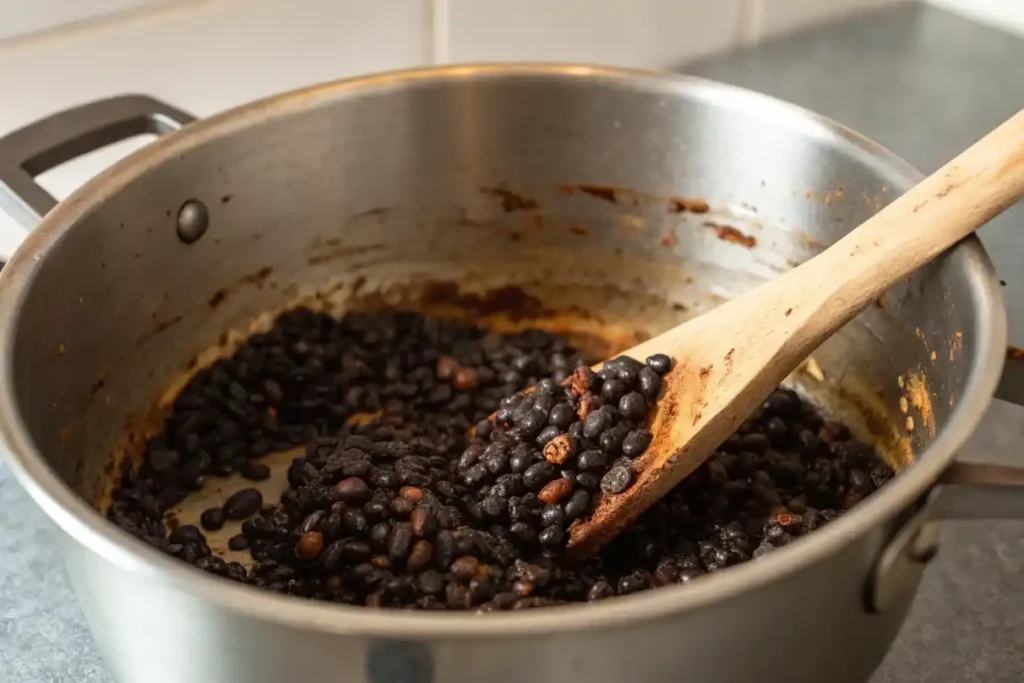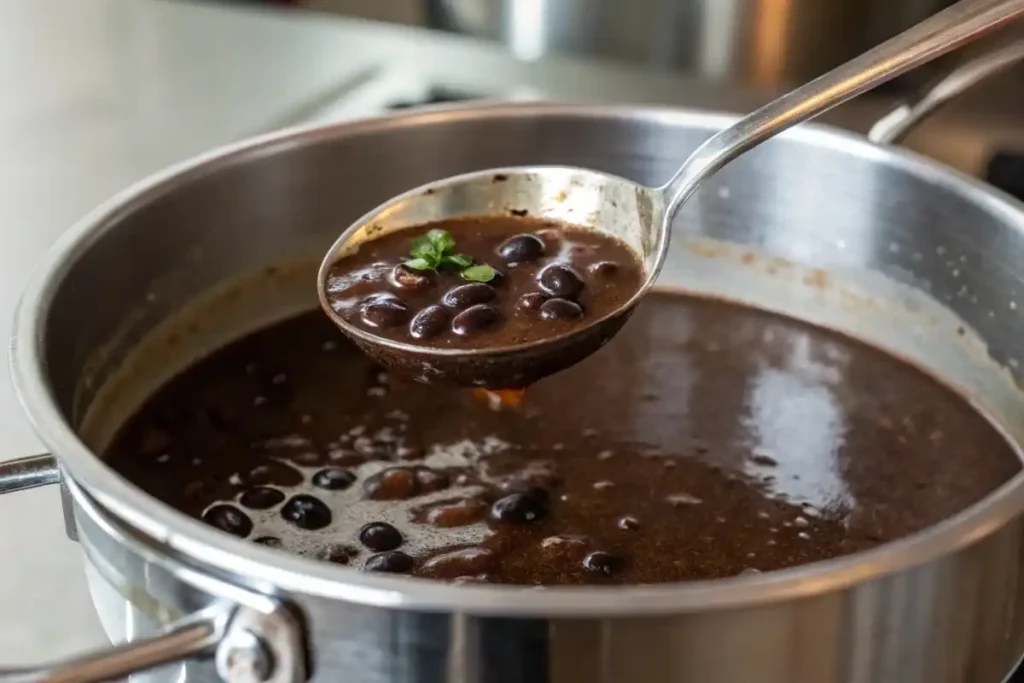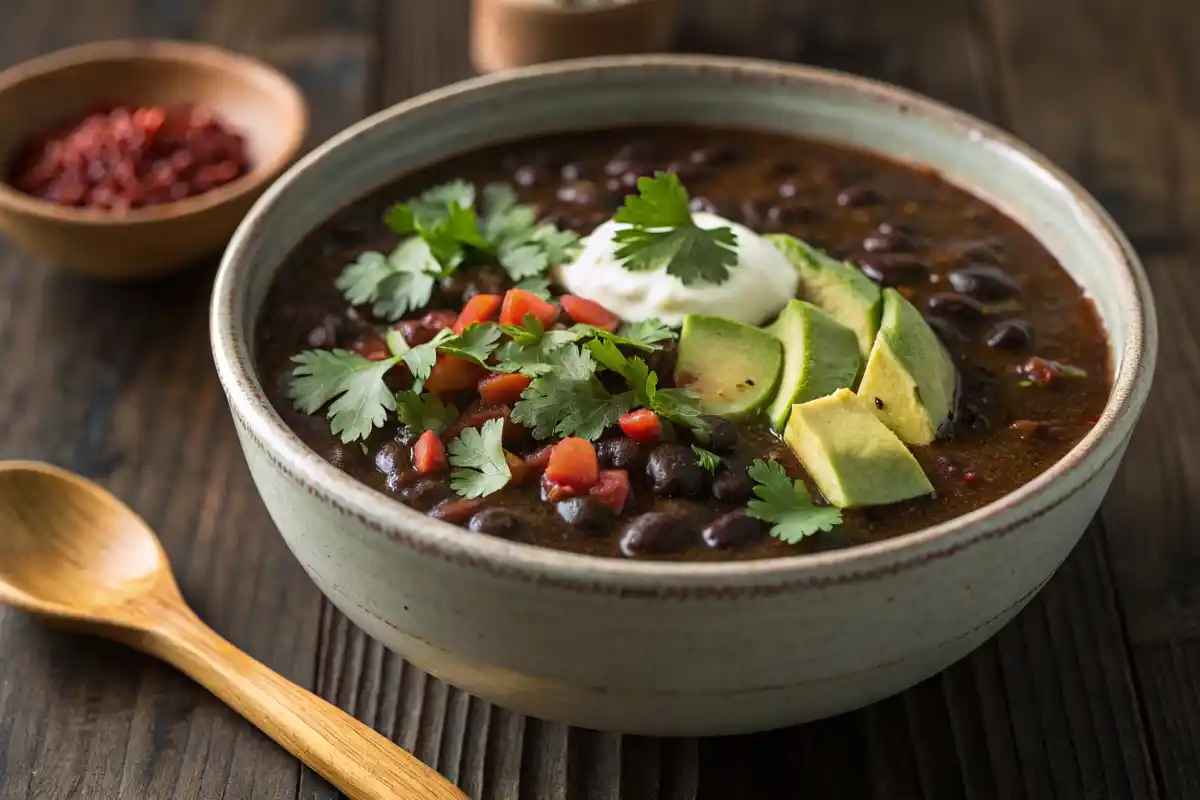Ever made a pot of black bean soup and thought, “Why does this taste so bitter?” Don’t worry, you’re not alone! Black bean soup is a delicious, hearty meal, but sometimes the flavor doesn’t hit quite right. In this guide, we’ll explore why bitterness happens, how to avoid it, and how to fix it when things go wrong. So grab a spoon, and let’s dive into the wonderful (and sometimes tricky) world of black bean soup!
Jump ahead to:
Understanding the Basics of Black Bean Soup
What Makes Black Bean Soup a Popular Dish?
Black bean soup is a comfort food for many, blending earthy, savory, and slightly sweet flavors into a bowl of pure happiness. Packed with protein, fiber, and vitamins, it’s a favorite for vegetarians and meat-lovers alike. It’s versatile too! You can spice it up, keep it mild, or load it with toppings like sour cream, cilantro, or avocado.
If you’re wondering about its health benefits, check out Is black bean soup good for you?.”
“Black bean soup is like a warm hug in a bowl, but even hugs can go wrong sometimes!”
Key Ingredients in Black Bean Soup

The beauty of black bean soup lies in its simplicity. If you’re looking for a unique twist, you might love this take on Purple Black Bean Soup, which brings an exciting color and depth to your bowl. Here’s a quick look at the typical ingredients:
| Ingredient | Quantity |
|---|---|
| Black beans (dry or canned) | 2 cups |
| Onion | 1 medium |
| Garlic | 3 cloves |
| Vegetable stock | 4 cups |
| Spices (cumin, paprika, etc.) | 1–2 tsp each |
| Lime juice | 1 tbsp |
These ingredients create a base that’s flavorful, nutritious, and perfect for experimenting with your own twists!
The Role of Flavor Balance in Cooking
Cooking is like conducting a symphony. Every ingredient plays a role, and if one goes out of tune, the whole song (or soup) can feel off. Bitterness often sneaks in when the balance of sweet, salty, sour, and umami flavors gets disrupted. In black bean soup, this balance is crucial for achieving that rich, satisfying taste.
Common Reasons for Bitter Tasting Black Bean Soup
Overcooking or Burning the Beans
Have you ever left beans on the stove for too long, only to find a burnt layer at the bottom? Overcooked or scorched beans release compounds that can taste bitter. It’s like when toast goes from golden brown to, well… charcoal. Always keep an eye on your beans and stir occasionally to avoid sticking.
Using Old or Poor-Quality Beans
Did you know that beans have a shelf life? Using old, stale beans can lead to bitterness because they lose their natural sweetness over time. When buying black beans, check the packaging date, and if they’re too dusty or brittle, it’s time to toss them. Fresh beans = fresh flavors!
Adding Bitter Ingredients Without Balance
Some ingredients, like citrus zest or certain spices, can be naturally bitter. While these can add depth to your soup, too much without balancing sweetness or saltiness might overpower the dish. Think of it like a seesaw one side can’t be too heavy.
Improper Cooking Techniques
Cooking beans can be a bit tricky. If they’re not soaked properly, their tough skins can trap compounds that release bitterness during cooking. Skipping the soaking step? That’s like trying to run a marathon without stretching first a recipe for disaster!

The Science Behind Bitter Tastes in Food
Understanding the Role of Alkaloids in Beans
Have you ever bitten into something and felt that sharp, unpleasant bitterness? In black beans, this could be due to natural compounds called alkaloids. These are plant defense mechanisms, kind of like nature’s way of saying, “Don’t eat me unless you cook me right!” While these compounds are harmless, they can leave a bitter aftertaste if not dealt with properly.
“Think of alkaloids as the villain in your soup story. Proper cooking is your superhero cape!”
How Heat Affects the Flavor Profile of Black Beans
Heat transforms beans from hard and starchy to soft and flavorful. But if you overdo it, you risk breaking down compounds that add sweetness and depth, leaving only the bitter ones behind. It’s like over-roasting coffee beans there’s a fine line between rich and burnt. Cooking beans at a steady, moderate temperature is key to preserving their natural flavors.
The Importance of Acid and Alkaline Balance in Soups
The pH level of your soup plays a big role in its taste. Too much acidity (from lime or tomatoes) can overwhelm the beans’ natural earthiness, tipping the scale toward bitterness. On the other hand, adding a pinch of baking soda can soften the beans faster and reduce bitterness. Balance is everything!
How to Prevent Bitterness in Black Bean Soup
Choosing Fresh, High-Quality Ingredients
The foundation of any great dish is its ingredients. Using fresh black beans, flavorful stock, and high-quality spices ensures that bitterness stays at bay. Think of it this way: Would you build a house with warped wood? Nope. The same logic applies here.
“Fresh ingredients are like the VIPs of your kitchen. Treat them well, and they’ll reward you with amazing flavors.”
Properly Soaking and Rinsing Black Beans
Skipping the soak? Big mistake. Soaking black beans overnight (or at least for 8 hours) helps remove some of those bitter-tasting compounds. Plus, rinsing them thoroughly before cooking washes away any surface residue that might add an off flavor. It’s a small step with big results!
If you’re using canned beans instead of dried ones, you might be wondering Should I rinse canned black beans for soup?. The answer can impact both flavor and texture!
Here’s a quick soaking guide:
- Quick soak: Boil beans for 2 minutes, remove from heat, cover, and let sit for 1 hour.
- Overnight soak: Cover beans with water and let them sit in the fridge for 8–12 hours.
Cooking Beans with Aromatics for Balanced Flavor
Aromatics like onions, garlic, and bay leaves are like the background singers to your black beans’ star performance. They enhance the overall flavor without overpowering. Cooking the beans with these ingredients infuses them with subtle sweetness and umami, masking any potential bitterness.
“Aromatics are the unsung heroes of your soup. Don’t skip them!”
Avoiding Overuse of Bitter Ingredients Like Citrus Zest
We get it a squeeze of lime or a sprinkle of zest can brighten up your soup. But too much? It’s like adding salt to a cake batter; it doesn’t belong in excess. Always taste as you go and balance bitter flavors with a touch of sweetness or saltiness. 🧂
Quick Fixes for Bitter Black Bean Soup
Adding Sweet or Umami Elements
If your soup’s bitterness is already set in, don’t panic. Adding a little sugar, honey, or even a sweet vegetable like carrots can counteract the bitterness. Umami-rich ingredients like soy sauce, miso, or a sprinkle of parmesan cheese also work wonders to balance the flavors.
Balancing with Acidity or Fat
A splash of vinegar or lime juice can add brightness, while a dollop of sour cream or a drizzle of olive oil can round out harsh flavors. Think of these as your soup’s “makeup” they enhance the good and hide the not-so-good.
Diluting the Soup Without Compromising Texture
If all else fails, you can always dilute the soup with more stock or water. While this might thin it out, you can blend a small portion of the beans to thicken it back up. It’s like hitting the reset button without losing what you’ve already cooked!

Tips for Making Perfect Black Bean Soup Every Time
Experimenting with Seasonings and Spices
Don’t be afraid to play around with flavors. Spices like cumin, smoked paprika, and chili powder can add depth, while fresh herbs like cilantro or parsley brighten things up. Cooking is like painting; the spices are your colors. Go ahead, create your masterpiece!
Interestingly, the color of black beans can change under certain conditions learn more in Why do black beans turn purple?.
Using Homemade or High-Quality Stock
The stock you use can make or break your soup. A rich, homemade vegetable or chicken stock adds layers of flavor that store-bought ones can’t match. If you’re short on time, choose a high-quality stock from the store. Just think of it as giving your soup a strong, flavorful foundation.
Incorporating Texture with Garnishes
Garnishes aren’t just for looks they add texture and flavor too. A dollop of sour cream, a sprinkle of crispy tortilla strips, or even a handful of diced avocado can take your soup from “meh” to “wow!” It’s like dressing up your favorite outfit with the perfect accessories.
Frequently Asked Questions About Black Bean Soup
Can Overripe Ingredients Cause Bitterness?
Yes! Overripe vegetables, especially onions and garlic, can develop a sharp, bitter taste. Always check your ingredients before cooking, and opt for fresh, firm produce. Think of it as giving your soup the VIP treatment it deserves only the best.
What’s the Ideal Cooking Time for Black Bean Soup?
Cooking time varies depending on whether you’re using canned or dried beans. Canned beans only need about 20–30 minutes to heat and absorb flavors, while dried beans can take 1–2 hours. Patience is key! Rushing the process can lead to uneven cooking and bitterness.
How Can I Make Black Bean Soup More Flavorful?
If your soup feels bland, try layering flavors. Start with a good sauté of onions and garlic, add your spices early to toast them, and finish with a splash of acidity like lime juice. Remember, flavor builds as it simmers, so give it some time to work its magic.
Conclusion: Mastering Black Bean Soup
Embracing Balance and Technique
At the end of the day, making black bean soup is about balance balancing flavors, textures, and cooking times. When you pay attention to the small details, you can turn a simple pot of beans into a flavorful, comforting meal that everyone will love.
Turning Mistakes into Learning Opportunities
If your soup doesn’t turn out perfect the first time, don’t sweat it! Every mistake is a chance to learn. Maybe you’ll discover a new flavor combo or a trick that works for you. Cooking isn’t about perfection; it’s about experimenting and enjoying the process.
So, next time you hear someone ask, “Why does my black bean soup taste bitter?” you’ll have all the answers and maybe even a few tricks up your sleeve. Time to grab a bowl and dig in. Happy cooking!

